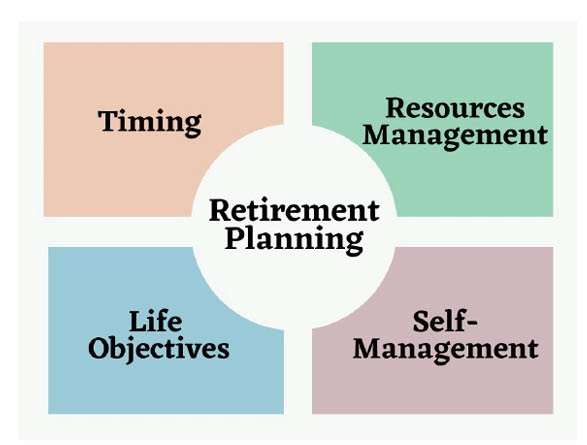Over the last few weeks, we have tried to cover the psychological realities of retirement. Individuals go through those varied emotions within different phases around their actual day of retirement. Today we will try to bring out what those transition phases are.
Pre-retirement: From the day we start our business or work in our places of employment, we knew that we will leave at some point in time. Obviously, the preferred option of leaving is retirement based on pre-known terms of engagement or personal discretion.
Ideally, the whole pre-retirement period should be a ‘retirement planning period’. However, there are a few factors that inhibit people from planning well for retirement during this period. First, many people starting out on their careers in their mid- to late twenties would have just been out of school and left their parents’ homes. Hence, their initial focus will be on getting a place for themselves to live in, furnishing it and providing the necessities of life. After that, the individual is already considering getting married to their dream person. Now ‘settled’, the couple will be raising and providing for a family as the children begin to arrive.
In addition to the preoccupation with daily grinds, retirement itself seems remote and distant even as the months and years roll by. Nonetheless, those who know and can afford to begin to make investments here and there towards retirement. But for most people, there isn’t a well-thought-out and coordinated plan towards retirement. There seems to be no pressure. Yet.
- Rivers residents worried as oil explosions claim lives
- 4 suspects arrested for robbing Taraba varsity
The ‘Big Day’: Regardless of what we did or didn’t do during the pre-retirement period, the day we will close from work and never return as staff of our organisations will always arrive. It doesn’t matter if it is four or forty years away. The day we officially retire, or any conveniently selected day is traditionally a day an individual will be ‘sent off’, ‘sent forth’, ‘pulled out’, etc. from their places of work. Depending on the organisation involved, there may be some sort of party, speeches, gifts given out, etc. The farewells are usually generous and emotional. From that day on, the individual is a ‘retiree’.
Often, some people begin a second career that may also be full-time. It does not matter, as long as the person has met the criteria for ‘traditional’ retirement from their organisations or in society, the person is a ‘retiree’. As mentioned in the definition earlier, retirement does not mean retiring from life! Rather, it is the official disengagement from your formal place of work or business based on years of service, age, or other set criteria.
Honeymoon: For many things that we go through in life, there are ‘honeymoons’. A honeymoon is a period in which we freely do all the legitimate things we have thought of, fantasised, and perhaps planned for as regards an event or a stage of our life. When a person retires, there is that immediate period from the ‘Big Day’ when they will get themselves immersed in doing all the things that they thought their work life had not allowed them to do. It may be travelling, engaging in some hobbies, visiting family and friends, starting an educational programme, etc. During this period, most newly retired persons want to do literally everything they have always imagined, which they also hope will last forever. But it is a post-retirement honeymoon, and for most people, it doesn’t last forever!
Disenchantment: For many retirees, the honeymoon period is filled with fantasies rather than a well-thought-out and sustainable plan of action. So, while the initial ‘freedom’ might seem attractive and interesting, soon the newly-retired begin to miss the structure and discipline that meant so much to them when they were fully at work. This may bring disenchantment and fright as the person begins to get concerned about having to go through the rest of their lives directionless. In addition, for many the structure of their finances begins to alarm them as they may only have their pension benefits as inflows whilst the outflows remain as they were before retirement. How long the disenchantment lasts depends on individuals and their circumstances.
Reality check: Thankfully, most people in retirement are sufficiently knowledgeable and experienced to begin to act towards facing their new realities after going through some level of disenchantment. They accept that the honeymoon is over, and they need to take control of their lives in a new context. The reality check is a re-orientation phase that takes the emerging realities into consideration to envision a new approach to life in retirement beyond the fantasies of the honeymoon. This is a phase in which the retiree faces their situation in a strong way with a resolve to live their retirement in accordance with their personal visions.
Moving on: The facts gathering and assessments in the reality check period culminate in coming up with a purpose, which may be an extension of what the individual has always lived up to or a new one which the individual wishes to live for. Beyond a purpose, the person will come up with a vision for which a structure and routine will developed. All these may happen rather effortlessly and will lead to positive living in retirement.
The duration of each of these phases will depend on the individual and what they make out of it. Next week, we will take up Adjusting to the Reality.

 Join Daily Trust WhatsApp Community For Quick Access To News and Happenings Around You.
Join Daily Trust WhatsApp Community For Quick Access To News and Happenings Around You.